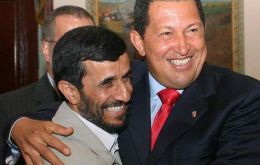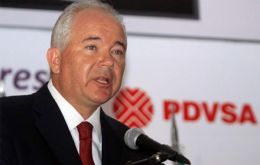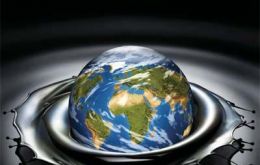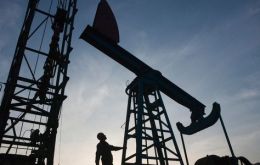MercoPress. South Atlantic News Agency
Tag: OPEC
-
Thursday, April 25th 2013 - 05:46 UTC
China to overtake US as main oil importer by 2014 says OPEC

China is on course to overtake the US as the world’s top crude importer by 2014, as the Asian country’s growing refining capacity boosts demand and America’s fracking boom cuts the need for foreign oil, OPEC said in its monthly report.
-
Wednesday, March 20th 2013 - 07:46 UTC
Venezuelan presidential candidate Capriles pledges “not another drop of oil to Cuba”

Venezuelan opposition presidential candidate on Monday vowed to end the OPEC nation's shipments of subsidized oil to the Castro brothers regime in Cuba, slamming acting President as a puppet of Havana.
-
Friday, March 8th 2013 - 07:22 UTC
Iranian president will attend Chavez funeral ceremony on Friday

Iranian President Mahmoud Ahmadinejad is expected in Caracas early Friday on time to pay tribute to his late Venezuelan counterpart, Hugo Chavez, who died earlier this week after a two-year battle with cancer. Ahmadinejad left Tehran for Caracas on Thursday.
-
Thursday, August 16th 2012 - 05:02 UTC
China soon to become Venezuela’s main trade partner; oil sales soared 60% this year

Venezuelan oil sales to China have jumped by 60% since the start of the year, the country's oil minister said in an interview published on Sunday in the state-run Correo del Orinoco.
-
Wednesday, July 11th 2012 - 19:35 UTC
OPEC lowers world oil demand forecast for next year

The Organization of the Petroleum Exporting Countries, left its forecast for 2012 growth in world oil demand unchanged at 0.9 million barrels a day, saying it expects growth to slow to 0.8 million barrels a day in 2013 due to a continuing global economic slowdown.
-
Monday, January 2nd 2012 - 03:46 UTC
Victory for Chavez in arbitration with Exxon Mobil over assets’ nationalization

An international arbitration panel has awarded US oil giant Exxon Mobil Corp 908 million dollars in compensation for Venezuela's 2007 nationalization of assets, less than 10% of what it sought in a dispute that pitted a top global oil company against one of the world's largest oil exporters.
-
Wednesday, December 14th 2011 - 16:48 UTC
OPEC agrees 30m bpd supply target; Saudis want oil below 100 dollars per barrel

OPEC oil producers on Wednesday sealed their first new production limit in three years in a deal that settles a 6-month-old argument over output levels firmly in Saudi Arabia's favour.
-
Monday, November 21st 2011 - 07:16 UTC
Ecuador says it is breaking oil daily production record

State-owned oil company Petroecuador said it broke its daily production record on Tuesday 15 November, pumping 156.359 barrels of crude on that day. Production from Jan. 1 to Nov. 8 totalled 47,096,086 barrels of crude, Petroecuador said in a report.
-
Monday, September 12th 2011 - 20:56 UTC
OPEC forecasts slower global oil demand and production

OPEC cut its forecast Monday for global oil demand and production, citing the slowing economic recovery. In its monthly report, the Organization of Petroleum Exporting Countries said it expected demand growth to drop to 1.1 million barrels per day -- 150,000 barrels per day fewer than its earlier forecasts.
-
Wednesday, August 17th 2011 - 23:15 UTC
Venezuela: biggest oil reserves, but also record corruption and mismanagement

Venezuela received an enviable honour last month: OPEC said it is sitting on the biggest reserves of crude oil in the world – even more than Saudi Arabia. But the Venezuelan oil industry is also sitting atop a well of trouble.
